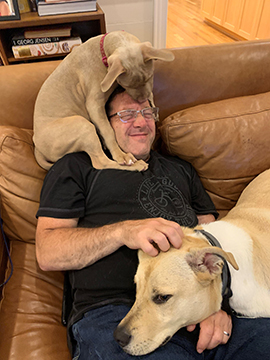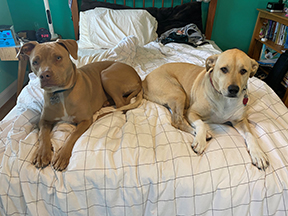NORFOLK SPCA
Mark B. Kerner, MD
Hampton Roads Orthopaedics Spine & Sports Medicine

Twenty-six years ago, Dr. Mark Kerner moved to Hampton Roads and promptly adopted Princess, an Australian shepherd mix, from the Norfolk SPCA.
Princess spent hours playfully herding Dr. Kerner’s young son Joshua around their backyard. On Joshua’s first day of school, she ran onto the bus and hid under his seat. “She was the first of multiple rescue dogs that truly became a part of our family,” Dr. Kerner relates.
That’s why serving on the Board of Directors for the Norfolk nonprofit is a joy for Dr. Kerner, who took the position about five years ago. He mainly works on fundraising efforts for programs that go far beyond the careful placement of companion animals in forever homes.
Founded in 1892 to address the mistreatment of working horses, the Norfolk SPCA is one of the nation’s oldest animal welfare groups. The no-kill shelter on Ballentine Boulevard takes in dogs, cats, rabbits, ferrets and other small animals, rehabilitating and rehoming about 2,000 pets a year. It provides a wide range of additional services to nearly 10 times that number.
“Our staff members are unsung heroes in this community,” Dr. Kerner says. “They play a huge role in giving our area’s animals a chance at a good life. What they see can be heartbreaking, and they don’t get paid nearly enough. It takes a big heart to be so dedicated.”
The SPCA also runs two veterinary clinics that offer free or low-cost care to the public without residency or income restrictions. The organization recently opened a new $400,000 Spay/Neuter Clinic Building on East Little Creek Road via an ongoing capital campaign.
Other medical services include microchip placements, vaccinations, wellness exams, dentistry procedures, simple surgeries such as cystotomy and hernia repair, and preventative or therapeutic treatments for fleas, ticks and heartworms.
Additionally, the SPCA operates a trap-and-release program to sterilize feral cats, which often reproduce rapidly. A separate adoption program places semi-feral barn cats in outbuildings and warehouses to live safely while helping to control rodent populations.

Throughout the COVID-19 pandemic, the nonprofit has run an Emergency Pet Pantry with food, treats and other supplies to assist struggling owners. Staff also has continued with educational campaigns on proper pet care, sometimes using animal ambassadors.
The SPCA relies on individual and corporate donations and a strong network of volunteers, including foster families who will step in if the shelter is full or an animal needs extra physical or emotional attention to grow healthy enough for adoption.
As a volunteer, Dr. Kerner has become the go-to guy for friends and colleagues interested in adopting a shelter pet. During the pandemic, he has helped place several dogs with nurses in his own practice.
Dr. Kerner himself is a devoted dad to three rescue animals: dogs Lily, 5, and foster-turned-permanent-resident Acadia, 1, both 75-pound “all-American mutts with a little bit of everything,” and cat Spot, an 11-year-old tabby. He describes his pets as uncomplaining, unselfish and entertaining bright spots at the end of every workday.
Similarly, Dr. Kerner has found his SPCA role to be a refreshing, rejuvenating commitment in a professional and volunteer calendar that typically revolves around medicine.
“This organization’s mission brings so much happiness to people and animals,” he says. “I would recommend for anyone to get involved in animal rescue – whether it’s making a donation, volunteering to walk a shelter dog, or taking a pet home. You will not regret it.”
To learn more, visit norfolkspca.com or call (757) 622-3319.

